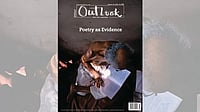Of all the things that he wrote about, Milan Kundera also wrote about the frontiers of translation. In The Book of Laughter and Forgetting, he talks about litost, the untranslatable feeling that can’t be located within the etymological spectra of other languages.
“Litost is a state of torment created by the sudden sight of one’s own misery,” he writes.
Litost is so many feelings. It is grief, sympathy, remorse, longing, love and misery. It is the concept of idyll and when confronted with misery, there is a loss of that innocence. That loss is universal.
Kundera said this word was like the wail of an abandoned dog, of someone looking at their own misery. In Part V called Litost, there are two lovers. The boy slaps his lover because she could swim better. He, who was plagued with the past and a disability from there, can’t begin to fathom why his lover had a happy childhood. That’s when he felt litost. When he put his arms around her, his litost melts away.
There is a restoration after violence. But there has been that state, a known one. To us all. Kundera said there were other sufferers too, that there is a word for it. A word that contains so much. A word that tells us that others have felt the same, that we aren’t alone in our misery and that feelings are relatable and sometimes, not translatable.






















